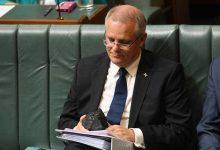The close link between Australia’s major coal lobby and the prime minister’s office under the Coalition government runs ever deeper, whoever the leader is at the time.
The chief of staff of new prime minister Scott Morisson is John Kunkel, the former deputy CEO of the Minerals Council of Australia, the same group that thoughtfully provided a lacquered lump of coal for the then Treasurer to wave around parliament in February last year in the middle of a drought.
Morrison was obviously impressed, and has appointed one of the country’s leading anti-wind campaigns as his new energy minister, splitting the portfolio from environment. The new environment minister is a former lawyer for a mining company.
Kunkel served as deputy CEO of the Minerals Council for 6 years and four months before spending two years as head of government affairs (a political lobbying position) for the country’s biggest coal producers, Rio Tinto.
Kunkel is a recent addition to the team, joining then Treasurer Morrison’s office in June this year.
Kunkel’s key role continues the close connection and the merry-go-round of advisors between the Minerals Council and key policy advisory positions in the Coalition government.
One of Malcolm Turnbull’s key advisors as prime minister was Sid Marris, who was a former policy officer at the Minerals Council.
The man who replaced him as head of environment and climate policy at the Minerals Council is Patrick Gibbons, who was the former advisor to then environment minister Greg Hunt, who made a run as deputy to failed leadership candidate Peter Dutton and got knocked out by his good fried Josh Frydenberg, now deputy leader and Treasurer.
Marris worked for nearly 9 years at the Minerals Council, and had previously been The Australian newspaper’s Canberra bureau chief.
Turnbull’s most recent chief of staff was Clive Mathieson, a former editor of The Australian. Ironic perhaps, that Turnbull should refuse to take questions from The Australian’s reporters at his last press conference on Friday.
Kunkel’s previous work includes with former consultancy Concept Economics, headed by two of the most ferocious opponents of climate action and renewable energy schemes, Henry Ergas and Brian Fisher, who was on Tony Abbott’s panel reviewing the renewable energy target.
Fisher, who now runs BAEconomics, last year presented a report to the Minerals Council about the level of subsidies to renewable energy in Australia.
Although vastly inflating the actual number and level of subsidies, that assessment has now become a standard “alternative fact” constantly referred to by the Murdoch media, the Coalition, and even at times by the ABC.
By a curious coincidence, that report for the Minerals Council was posted on the BAEconomics website (February 8) on the very same day that Morrison waved around and then coddled the lump of coal delivered to him by the Minerals Council.
See also: “Scoal-mo” as PM: What does that mean for climate and energy policy?








